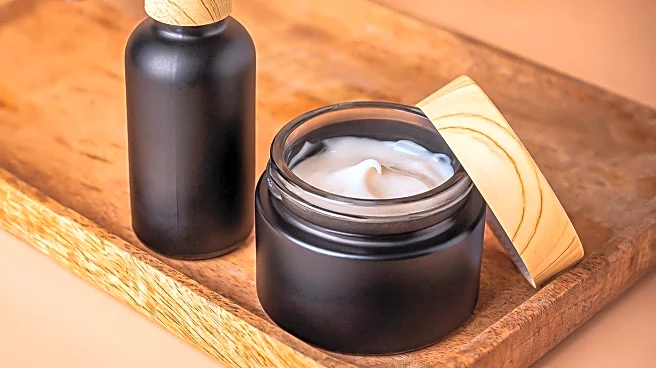What's Happening?
Skincare brands are increasingly targeting users of GLP-1 medications like Ozempic, which have been influential in aesthetic medicine over the past five years. These medications are associated with rapid weight loss, which can lead to changes in skin quality, including loss of facial volume and skin laxity. Brands such as Clinique and SkinCeuticals are marketing products specifically designed to address these issues, with claims of lifting and smoothing skin. Plastic surgeons have also launched products aimed at GLP-1 users, addressing concerns such as collagen and elastin fiber thinning. Studies indicate that GLP-1 medications may decrease collagen and moisture levels in the skin, leading to aging signs like wrinkles and dullness.
Why It's Important?
The development of skincare products for GLP-1 users highlights the intersection of healthcare and beauty industries. As more individuals turn to GLP-1 medications for weight loss, the demand for products that address associated skin changes is likely to grow. This trend could lead to increased innovation in skincare formulations, focusing on ingredients that support skin health during weight loss. The issue also underscores the importance of understanding the broader impacts of weight loss medications on skin health, potentially influencing future research and product development in the beauty industry.
What's Next?
As the market for GLP-1-targeted skincare products expands, consumers may see more brands developing specialized formulations. This could lead to increased competition among skincare companies to provide effective solutions for skin concerns related to weight loss medications. Additionally, ongoing research into the effects of GLP-1 medications on skin health may inform future product innovations and marketing strategies. Healthcare professionals may also play a role in advising patients on skincare routines that complement their weight loss treatments.
Beyond the Headlines
The focus on skincare for GLP-1 users raises ethical considerations regarding the marketing of beauty products to individuals undergoing medical treatments. It also highlights the need for transparency in product claims and the importance of evidence-based formulations. As the beauty industry continues to evolve, the integration of medical insights into product development may become more prevalent, potentially leading to new standards in skincare efficacy and safety.











